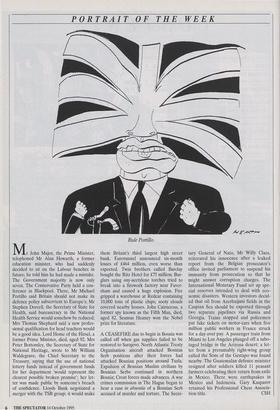PORTRAIT OF THE WEEK
Rule Portillo.
Mr John Major, the Prime Minister, telephoned Mr Alan Howarth, a former education minister, who had suddenly decided to sit on the Labour benches in future; he told him he had made a mistake. The Government majority is now only seven. The Conservative Party held a con- ference in Blackpool. There, Mr Michael Portillo said Britain should not make its defence policy subservient to Europe's; Mr Stephen Dorrell, the Secretary of State for Health, said bureaucracy in the National Health Service would somehow be reduced; Mrs Thomas Shephard said a new profes- sional qualification for head teachers would be a good idea. Lord Home of the Hirsel, a former Prime Minister, died, aged 92. Mrs Peter Bottomley, the Secretary of State for National Heritage, wrote to Mr William Waldegrave, the Chief Secretary to the Treasury, saying that the use of national lottery funds instead of government funds for her department 'would represent the clearest possible broken promise'; her let- ter was made public by someone's breach of confidence. Lloyds Bank negotiated a merger with the TSB group; it would make them Britain's third largest high street bank. Eurotunnel announced six-month losses of £464 million, even worse than expected. Twin brothers called Barclay bought the Ritz Hotel for £75 million. Bur- glars using oxy-acetylene torches tried to break into a firework factory near Faver- sham and caused a huge explosion. Fire gripped a warehouse at Redcar containing 10,000 tons of plastic chips; sooty clouds covered nearby houses. John Cairncross, a former spy known as the Fifth Man, died, aged 82. Seamus Heaney won the Nobel prize for literature.
A CEASEFIRE due to begin in Bosnia was called off when gas supplies failed to be restored to Sarajevo. North Atlantic Treaty Organisation aircraft attacked Bosnian Serb positions after their forces had attacked Bosnian positions around Tuzla. Expulsion of Bosnian Muslim civilians by Bosnian Serbs continued in northern Bosnia; Croat forces made advances. A war crimes commission in The Hague began to hear a case in absentia of a Bosnian Serb accused of murder and torture. The Secre- tary General of Nato, Mr Willy Claes, reiterated his innocence after a leaked report from the Belgian prosecutor's office invited parliament to suspend his immunity from prosecution so that he might answer corruption charges. The International Monetary Fund set up spe- cial reserves intended to deal with eco- nomic disasters. Western investors decid- ed that oil from Azerbaijani fields in the Caspian Sea should be exported through two separate pipelines via Russia and Georgia. Trains stopped and policemen put fake tickets on motor-cars when five million public workers in France struck for a day over pay. A passenger train from Miami to Los Angeles plunged off a sabo- taged bridge in the Arizona desert; a let- ter from a presumably right-wing group called the Sons of the Gestapo was found nearby. The Guatemalan defence minister resigned after soldiers killed 11 peasant farmers celebrating their return from exile in Mexico. There were earthquakes in Mexico and Indonesia. Gary Kasparov retained his Professional Chess Associa-










































































 Previous page
Previous page